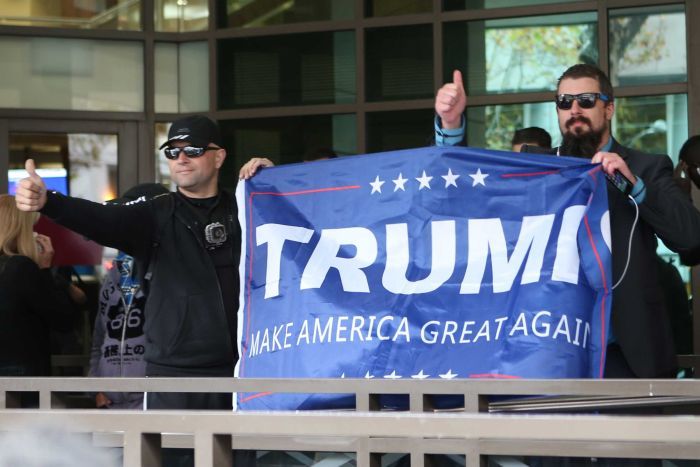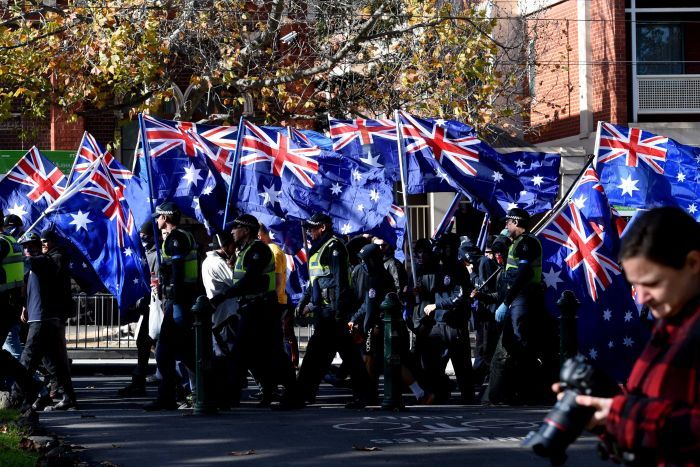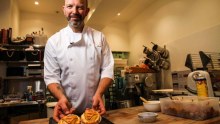Christchurch shooting accused Brenton Tarrant supports Australian far-right figure Blair Cottrell
Updated
Three years before the mass shooting in Christchurch, Brenton Tarrant was lavishing praise on prominent Australian far-right nationalist Blair Cottrell, referring to him as "Emperor".
Key points:
- Among Mr Tarrant's posts was one joining UPF leaders in celebrating the election of Donald Trump
- Mr Cottrell says he was made aware of someone with Mr Tarrant's name donating to UPF
- New far-right group the Lads Society say they were visited by ASIO after the Christchurch attack
The ABC's Background Briefing has uncovered an archive of comments from the accused mosque shooter, which were posted on the now deleted Facebook pages of Australian far-right groups United Patriots Front (UPF) and True Blue Crew (TBC).
The comments give an insight for the first time into Tarrant's early radical views.
Tarrant, 28, is facing trial in New Zealand for his alleged involvement in the shooting deaths of 50 people at two mosques in Christchurch last week — part of which was live streamed on his Facebook page.
At this stage, Tarrant has been charged with one count of murder.
 Photo:
The United Patriots Front's Facebook page has been deleted. (Facebook: United Patriots Front)
Photo:
The United Patriots Front's Facebook page has been deleted. (Facebook: United Patriots Front)
The alleged mosque shooter's online and travel history has become the focus of an international investigation spanning at least four continents and several intelligence agencies.
But in the wake of the massacre, his social media accounts were wiped from the internet, leaving very little information regarding the connections he made with individuals and groups on the far-right that operate prominently online.
What remained were fragments and digital impressions of a well-travelled young man who frequented hate-filled anonymous messaging boards and was deeply engaged in a global alt-right culture.
Although the shooter claimed in a manifesto uploaded before the attack that he was never a member of any group, the archive verified by Background Briefing reveals an allegiance to a number of high-profile Australian far-right figures.
And while specific details remain murky, these revelations about Tarrant's interactions with domestic far-right groups shed light on a young man captivated by white nationalism and its high-profile figurehead, Mr Cottrell.
Part of a movement
Mr Cottrell emerged as a public figure in 2015 for his opposition to a mosque in Victoria and a graphic stunt in which he performed a mock beheading.
Since then he has become the highest profile leader of Australia's alt right.
For many he is the symbol of the so-called "white resistance" in Australia and is the figurehead for a movement that in recent times has been defined by its virulent anti-Islamic views.
Before the Facebook page of his group, the UPF, was deleted, it had more than 120,000 followers, and the data reveals Tarrant also followed the group.
Tarrant's comments, dating back as early as April 2016, showed the Australian-born man was a vocal supporter of then UPF-leader Mr Cottrell.
In the information, Tarrant made more than 30 comments on the UPF and TBC pages over a 10-month period.
Although there are no screenshots of his comments on the UPF and TBC pages, Background Briefing has verified their authenticity by comparing the archive's preserved metadata — including Facebook ID numbers and timestamps — against other public posts shared by UPF and TBC supporters.
This allowed us to connect names to comments.
In one instance, metadata shows that when members from the UPF violently clashed with counter-protesters in Coburg in 2016, Tarrant felt compelled to respond to Mr Cottrell's critics online.
"Communists will get what communists get, I would love to be there holding one end of the rope when you get yours traitor," Tarrant posted.
This week the former leadership of the UPF distanced themselves from Tarrant.
In a statement posted to their new far-right men's group called the Lads Society last week, they say they met with officers from Australian Security Intelligence Organisation (ASIO) and state police services about the Christchurch events.
ASIO, the Australian Federal Police (AFP), Victoria Police and NSW Police declined to confirm the meeting.
The Lads Society statement said the organisation condemned "politically motivated violence" and said Tarrant "did not belong to any group and that he acted alone".
But it is clear from our archives that he was an active supporter of these groups.
A close follower
On the night Donald Trump was elected in November 2016, our archived Facebook posts show Tarrant was closely following Mr Cottrell and his then fellow UPF leader Tom Sewell's commentary.
When it became clear Mr Trump would win, Mr Cottrell and Mr Sewell live streamed their celebrations from Melbourne's Federation Square.
 Photo:
Blair Cottrell and Tom Sewell posted a celebratory video the night Donald Trump was elected. (Facebook: United Patriots Front)
Photo:
Blair Cottrell and Tom Sewell posted a celebratory video the night Donald Trump was elected. (Facebook: United Patriots Front)
In the video, Mr Cottrell and Mr Sewell are seen wearing neat collared shirts and grinning ear-to-ear as they described Mr Trump's victory, declaring it as the end to political correctness and "Marxism" in the US.
Tarrant was online celebrating with Mr Cottrell and Mr Sewell.
"Simply one of the most important events in modern history," Tarrant commented on the live video.
It was here that Tarrant was most effusive in his support of Mr Cottrell and the movement.
"Globalists and Marxists on suicide watch, patriots and nationalists triumphant — looking forward to Emperor Blair Cottrell coming soon," he wrote.
Tarrant made similar comments months earlier, when Mr Cottrell appeared on national TV.
"Knocked it out of the park tonight Blair," he wrote.
"Your retorts had me smiling, nodding, cheering and often laughing.
"Never believed we would have a true leader of the nationalist movement in Australia, and especially not so early in the game.
"Would gladly stand behind you."
Tarrant's comments in the same period also demonstrate he was invested in the rivalry between the country's far-right groups.
 Photo:
Members of the UPF unfold a Trump banner outside the Melbourne Magistrates' Court. (AAP: David Crosling)
Photo:
Members of the UPF unfold a Trump banner outside the Melbourne Magistrates' Court. (AAP: David Crosling)
He directed anger at one of the UPF founders, Neil Erikson, and former UPF leader Shermon Burgess and called them "useful idiots".
"Leave the nationalist leadership to Blair and the TBC, or be named obvious plants and traitors," Tarrant wrote in July 2016 on the TBC Facebook page.
Those comments and their metadata were archived in text form by an anonymous source when those pages were still active on Facebook.
As far as we know the ABC is the only media outlet with access to the archives.
The last activity we have from Tarrant on the UPF Facebook page is from January 2017, in response to a post discussing Mr Cottrell's impending appearance in the Melbourne Magistrates' Court over staging a fake beheading in Bendigo two years earlier.
Tarrant was one of more than 200 people who commented on this thread in support of Mr Cottrell.
Mr Cottrell and two other former UPF members were found guilty of inciting serious contempt of Muslims in September 2017.
'I didn't know who he was'
When confronted with Tarrant's activity on the UPF Facebook page, Mr Cottrell told the ABC he did not know Tarrant personally.
"There is no relationship, I didn't know who he was. And you won't find any evidence to the contrary," he said.
However, Mr Cottrell said it was possible someone in the organisation had met Tarrant.
He said since the shooting, he had learned that a donation had been made to UPF in Tarrant's name some years earlier.
International security expert and former senior diplomat, Neil Fergus, said ASIO has been closely monitoring far-right extremists for some time.
"They have been extremely active in this area in recent years and the past decades," Mr Fergus said.
Intelligence agencies like ASIO have invested more resources into threats from jihadists, particularly since the 2002 Bali bombings, he indicated.
Mr Fergus said he expected this to change after the Christchurch attacks.
Mr Fergus said while these far-right groups in themselves may not be dangerous, they could be a breeding ground for dangerous people.
"There is no denying that there have been individuals attracted to these groups who have a propensity to engage in more extreme behaviour, including violent behaviour," he said.
Michael Edison Hayden is a senior investigator on white supremacists' digital strategies for the Southern Poverty Law Centre (SPLC), a non-profit which is tracking hate crimes across the US and the world.
He said the Christchurch shooting was a "new reality" where the views and statements of the extreme far-right were having a profound reach on young disaffected men.
He said the accused shooter's manifesto and social media strategy was more "self-aware and performative" than anything he had seen.
"It's a signifier he was immersed in this culture of radicalisation, that he is speaking to them and he is responding to what he's seen from them and what he wants them to see," Mr Hayden said.
Mr Hayden said race-related killings from far-right personalities around the world were often based on fears about being replaced by immigrants and having their white identity erased.
"Once you get the idea you're being eliminated, once you integrate that into your everyday way of thinking, they feel like violence is being inflicted against them day in and day out," he said.
"Which is, of course, a complete perversion of the truth."
- Father and son the first Christchurch victims laid to rest after attack
- PM Scott Morrison slams 'deeply offensive' Turkish President's Gallipoli comments
- New Zealanders continue to shop for guns as regulations loom
- 'Kia kaha Christchurch': The beautiful tributes for Christchurch mosque attack victims
- PM's office received shooter's manifesto minutes before attack
- Christchurch mosque shooter used same radicalisation tactics as Islamic State, expert says
- New Zealand shooter rushed by worshipper Abdul Aziz at Linwood mosque
- Opinion: The dark reality is right-wing extremists don't stand out in our toxic political environment
- Analysis: We're in a war in which the casualties are not strangers — they're our neighbours
- 'Dad didn't make it': New Zealanders mourn loved ones killed in shootings
- Reporting a massacre: Why the ABC didn't share the shooter's 'manifesto'
- Opinion: Why you should think twice about watching the Christchurch shooting live stream
Topics: race-relations, community-and-society, internet-culture, information-and-communication, terrorism, australia
First posted
















